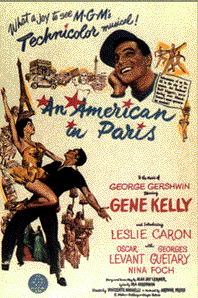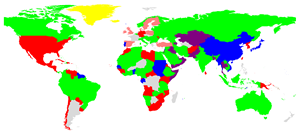 In the 1951 film version of Gershwin's "An American In Paris", Gene Kelly as Jerry Mulligan explains why he's chosen the life of an expatriate:
In the 1951 film version of Gershwin's "An American In Paris", Gene Kelly as Jerry Mulligan explains why he's chosen the life of an expatriate:
Back home everyone said I didn't have any talent. They might be saying the same thing over here, but it sounds better in French.
In fact, "everything sounds better in French", and in particular, "pop music sounds better in French". Or at least, many English speakers have been telling themselves things like this for the past couple of centuries. You could look it up.
But the linguistic worm has turned, at least with respect to rock lyrics.
According to Bertrand Dicale "Pourquoi ces Français chantent en anglais", Le Figaro, 11/26/2007,
Le temps est à l’anglais. Pas l’anglais phonétique et scolaire des yé-yé, auxquels les Anglais ne comprenaient rien. La langue anglaise qui se chante aujourd’hui en France est celle du folk contemporain ou de la pop élégante, une langue qui demande beaucoup plus que des cours d’anglais de terminale, et qui aujourd’hui rencontre son public, en France et à l’étranger.
The time belongs to English. Not the phonetic and academic English of yé-yé [link], which English speakers didn't understand at all. The English language in today's songs in France is that of contemporary folk or of elegant pop, a language which requires a lot more than a high-school English course, and which is now finding its audience, in France and abroad.
I missed this article last fall, but yesterday I heard an interview on the BBC World Service with Julien Garnier, from the band Hey Hey My My, who explained (as I recall) that he prefers to write in English, because simple things sound more meaningful in English than they do in French. It struck me that there may be some sort of reciprocal "the other language's grass is greener" effect here, where the extra effort needed to process a foreign language really does create more of (certain kinds of) meanings. (Or a more obvious and less interesting alternative: simple poetic phrases are hard to translate.)
Read the rest of this entry »

 In the 1951 film version of Gershwin's "
In the 1951 film version of Gershwin's "